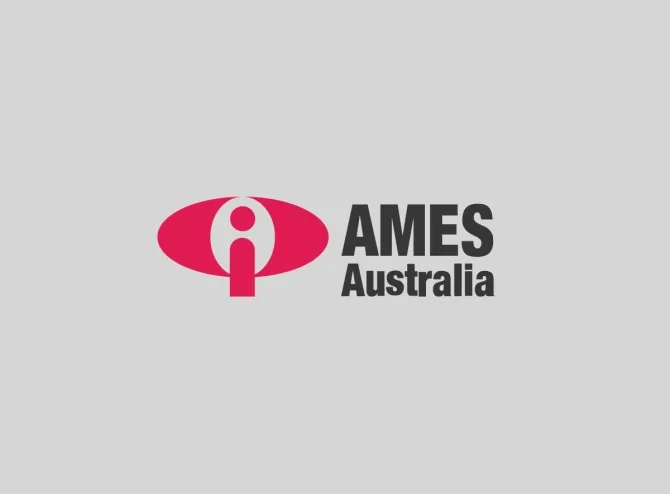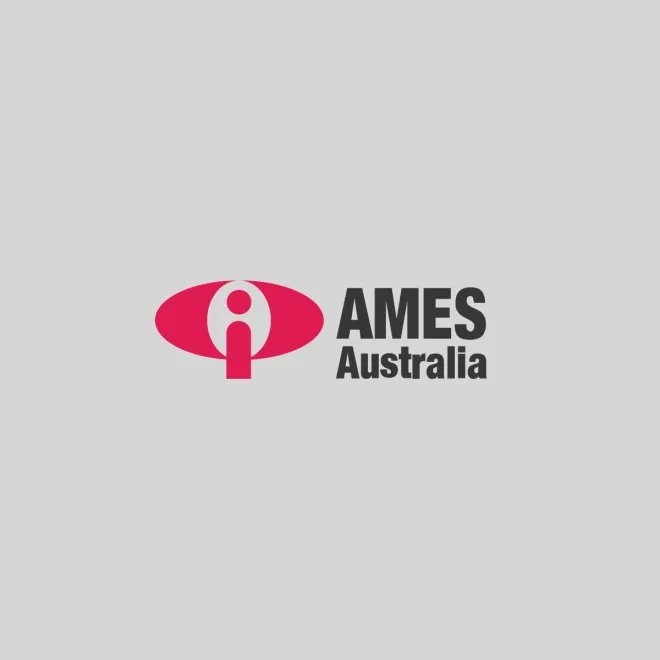AMES Australia's communication team have summarised the following content, originally published by the ACCC, State Government of Victoria, as scammers are using the spread of COVID-19 to take advantage of people across Australia, scammers may pretend to have a connection with you - So it’s important to stop and check, even when you are approached by what you think is a trusted organisation. If you have been scammed or have seen a scam, you can make a report on the Scamwatch website, and find more information about where to get help.
There is an increased reporting of email and SMS Scams claiming to be from ATO.
Please DO NOT click any suspicious links and for anything you need to do with tax, go directly to my.gov.au or ato.gov.au. Read further here https://www.ato.gov.au/General/Online-services/Identity-security/Scam-alerts/#July2020SMSandemailscam
These are a few other examples, but there are many more. If your experience does not match any of the examples provided, it could still be a scam. If you have any doubts at all, don’t proceed:
Phishing – Government impersonation scams
Scammers are pretending to be government agencies providing information on COVID-19 through text messages and emails ‘phishing’ for your information. These contain malicious links and attachments designed to steal your personal and financial information.
In the examples below the text messages appear to come from ‘GOV’ and ‘myGov’, with a malicious link to more information on COVID-19.
Examples of phishing scams impersonating government agencies
Department of Health impersonation email
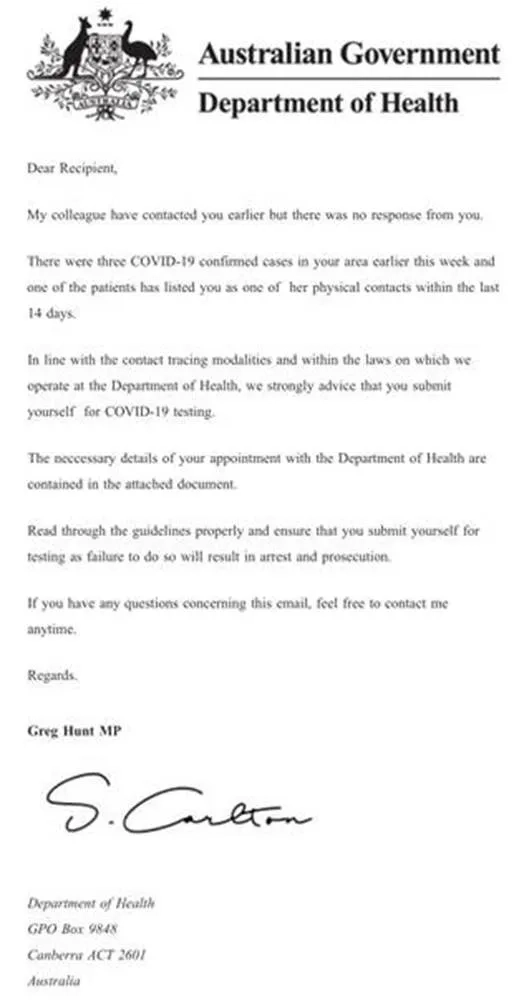
Fake myGov texts
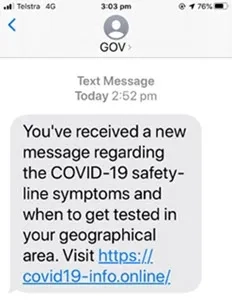
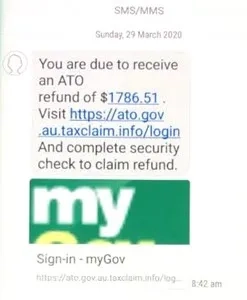
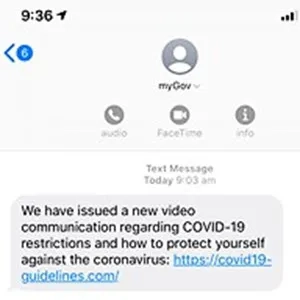
Scammers are also pretending to be Government agencies and other entities offering to help you with applications for financial assistance or payments for staying home.
Examples of payment or financial assistance scams
Fake government subsidy phishing scam
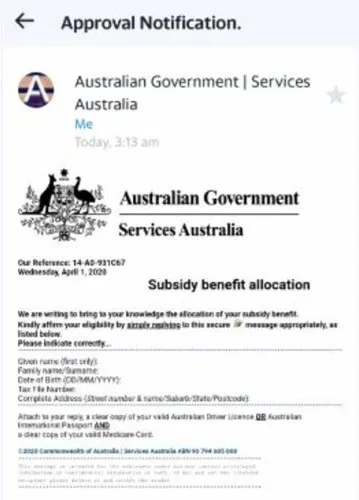
Fake ATO tax credit scam
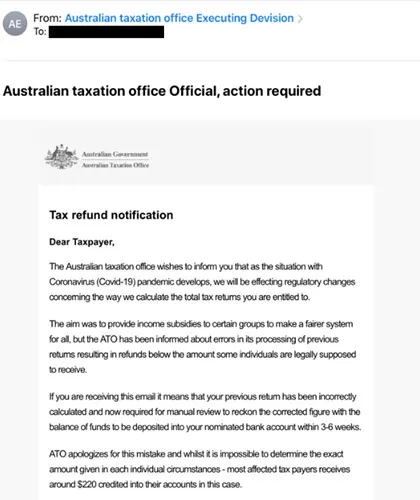
Fake economic support payment text
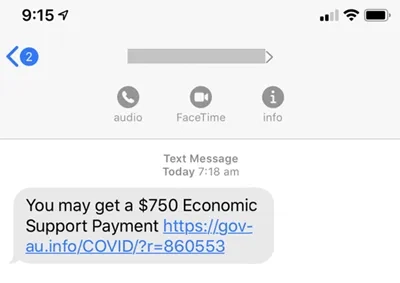
Tips to protect yourself from these types of scams:
-
Don’t click on hyperlinks in text/social media messages or emails, even if it appears to come from a trusted source.
- Go directly to the website through your browser. For example, to reach the MyGov website type ‘my.gov.au’ into your browser yourself.
- Never respond to unsolicited messages and calls that ask for personal or financial details, even if they claim to be a from a reputable organisation or government authority — just press delete or hang up.
Phishing – Other impersonation scams
Scammers are pretending to be from real and well known businesses such as banks, travel agents, insurance providers and telco companies, and using various excuses around COVID-19 to:
- ask for your personal and financial information
- lure you into opening malicious links or attachments
- gain remote access to your computer
- seek payment for a fake service or something you did not purchase.
Examples of other phishing scams
Fake bank phishing text
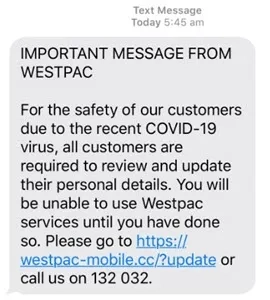
Fake insurance phishing text
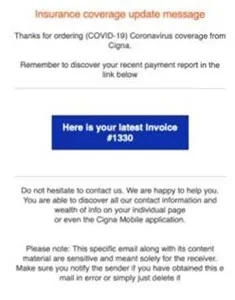
Fake voucher phishing text

Tips to protect yourself from these types of scams:
- Don’t click on hyperlinks in text/social media messages or emails, even if they appear to come from a trusted source.
- Never respond to unsolicited messages and calls that ask for personal or financial details — just press delete or hang up.
- Never provide a stranger remote access to your computer, even if they claim to be from a telco company such as Telstra or the NBN Co.
- To verify the legitimacy of a contact, find them through an independent source such as a phone book, past bill or online search.
Superannuation scams
Scammers are taking advantage of people in financial hardship due to COVID-19 by attempting to steal their superannuation or by offering unnecessary services and charging a fee.
The majority of these scams start with an unexpected call claiming to be from a superannuation or financial service.
The scammers use a variety of excuses to request information about your superannuation accounts, including:
- offering to help you access the money in your superannuation
- ensuring you’re not locked out of your account under new rules.
- checking whether your superannuation account is eligible for various benefits or deals.
Example of a superannuation scam
A scammer will call pretending to be from a superannuation or financial service. They may refer to the government’s superannuation early release measures, and ask questions such as:
- Have you worked full time for the last 5 years?
- Are you going to apply for the $10 000 superannuation package?
Or falsely claim:
- Inactive super accounts will be locked if not merged immediately.
Superannuation early-access scams
Many Australians are facing financial hardship due to the COVID-19 pandemic. On 22 March, the Australian Government announced eligible individuals would be allowed early access to their superannuation. Scammers are taking advantage of the government’s early-release measures in a variety of phishing scams designed to steal your superannuation.
For more information, see our Superannuation early-access scams fact sheet.
Tips to protect yourself from these types of scams:
- Never give any information about your superannuation to someone who has contacted you — this includes offers to help you access your superannuation early under the government’s new arrangements.
- Hang up and verify their identity by calling the relevant organisation directly — find them through an independent source such as a phone book, past bill or online search.
- See our Scamwatch media release warning about superannuation scams.
- For more information on superannuation scams visit ASIC’s MoneySmart website.
Other Useful links:
AMES Blogs: content regarding employment, studies, community works and more.
COVID19 Daily Updates, March-June 2020





